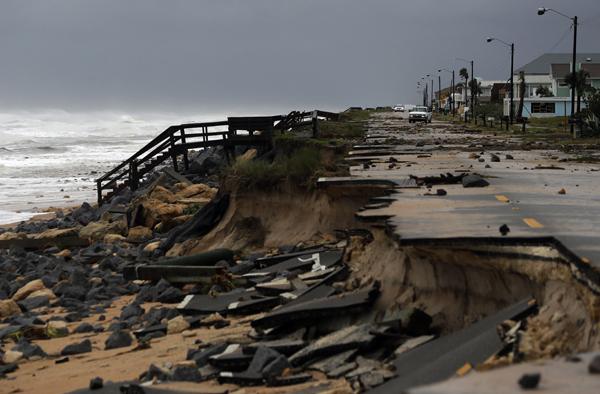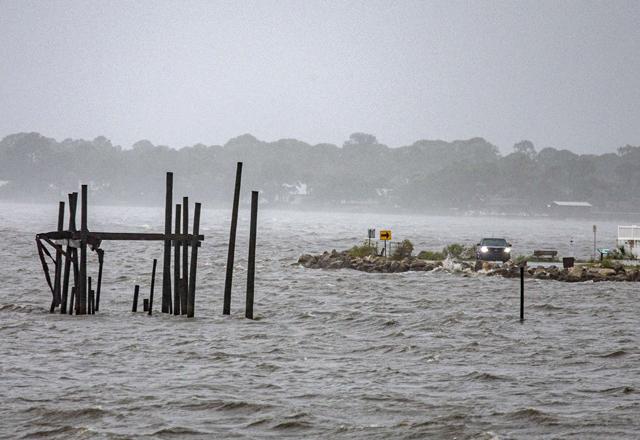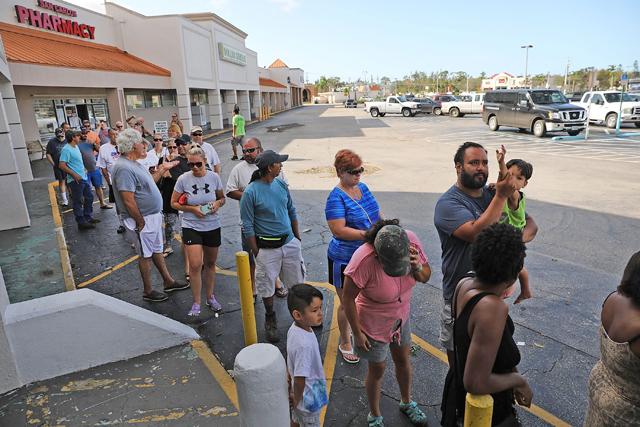You are here
Deadly Hurricane Matthew soaks southeastern US coast
By Reuters - Oct 08,2016 - Last updated at Oct 08,2016

An official vehicle navigates debris as it passes along Highway A1A after it was partially washed away by Hurricane Matthew, on Friday, in Flagler Beach, Florida (AP photo)
JACKSONVILLE BEACH, Fla./CHARLESTON, S.C — Hurricane Matthew’s winds diminished on Saturday as it headed towards the Carolinas after killing almost 900 people in Haiti and causing major flooding and widespread power outages in the southeastern United States.
The storm, which left flooding and wind damage in Florida, was soaking coastal Georgia and South Carolina on Saturday, but packing a diminished punch. Wind speeds had dropped to less than 136km per hour making it a Category 1 hurricane, the weakest on the Saffir-Simpson scale of 1 to 5.
At least four deaths in Florida were attributed to the storm, which knocked out power to least 1.5 million households and businesses in the southeastern United States.
In Florida, 775,000 are still without power, according to state utilities, while in South Carolina 433,000 had no power, Governor Nikki Haley said. Georgia Power said at least 275,000 were without power in the state.
Roads in Jackson Beach were littered with wood, including sections of a historic quarter-mile-long pier, and
15cm water clogged some intersections. Moderate damage could be seen on beachfront businesses, with fences and awnings torn down.
“We rode out the storm. It wasn’t this bad at our house, but here there’s a lot of damage,” said Zowi Cuartas, 18, as he watched people pick up shattered wooden signs knocked down by the wind and waves near the beach. “We were prepared to lose our house.”
Streets in downtown Charleston were flooding on Saturday morning up to the tops of tires on some cars. At the High Battery at Charleston peninsula’s tip, waves were close to topping the sea wall with spray splashing onto East Bay Street.
“It blew like hell,” said resident and writer Roger Pinckney, 70.
The toll in the United States was far less devastating than in Haiti, where at least 877 people were killed, a death toll that ticked up as information trickled in from remote areas, according to a Reuters tally of tolls from officials.
Matthew rampaged through Haiti’s western peninsula on Tuesday with 233kph winds and torrential rain. Some 61,500 people were in shelters, officials said, after the storm hurled the sea into fragile coastal villages.
The Mesa Verde, a US Navy amphibious transport dock ship, was en route to Haiti to support relief efforts. The ship has heavy-lift helicopters, bulldozers, fresh-water delivery vehicles and two surgical operating rooms.
Four killed in Forida
The NHC predicted the storm would possibly be striking the US coast on Saturday morning or afternoon.
“Regardless of whether or not the centre makes landfall, hurricane-force winds in the northern eyewall will lash much of the coast of South Carolina,” an NHC advisory said.
Matthew sideswiped Florida’s coast with winds of up to 195kph but did not make landfall there.
Governors in several states held news conferences on Saturday morning, including Florida, North Carolina and South Carolina. North Carolina Governor Pat McCrory warned that storm surges and high winds could cause serious problems. He said he was “extremely concerned” that the hurricane downgrade will cause residents not to take warnings seriously.
Forecasters warned of flooding as 40cm of rain were expected to fall in parts of the region along with massive storm surges and high tides.
Some 20cm of rain had fallen in the Savannah, Georgia area where Matthew downed trees and caused flooding.
Though gradually weakening, Matthew — which triggered mass evacuations along the US coast — was forecast to remain a hurricane until it begins moving away from the US Southeast coast on Sunday, according to the NHC.
President Barack Obama and officials urged people to heed safety instructions.
As the storm moved north, Florida officials urged residents who had evacuated not to rush back to homes that still lacked power on streets clogged with debris.
“You are going to continue to see some flooding, damage and power outages,” Jacksonville Mayor Lenny Curry told reporters on Saturday, adding that the roads into the beach area would be reopened to residents around noon.
Related Articles
MIAMI — Tropical Storm Elsa made landfall in Florida on Wednesday, lashing the Gulf Coast of the southern US state with strong winds and hea
PORT-AU-PRINCE — Hurricane Elsa churned through the Caribbean early on Saturday, bringing powerful winds and threatening to pile further mis
FLORIDA CITY/MIAMI — Residents returned on Tuesday to parts of the Florida Keys Archipelago that was hammered by Hurricane Irma’s high winds


















